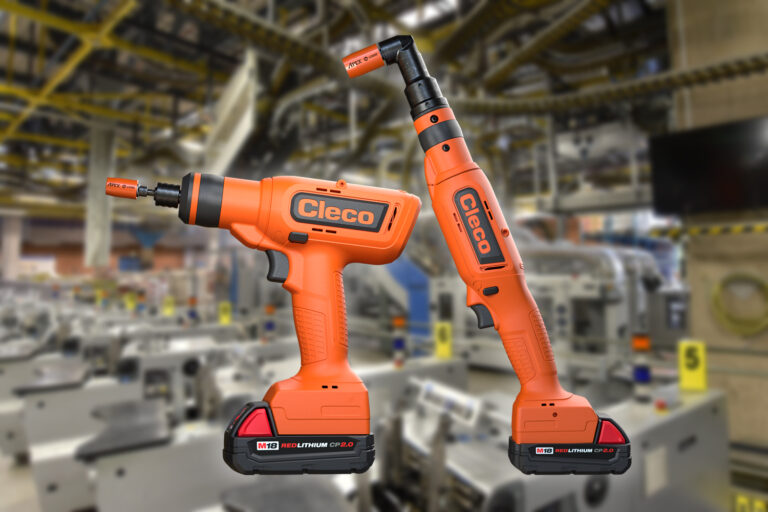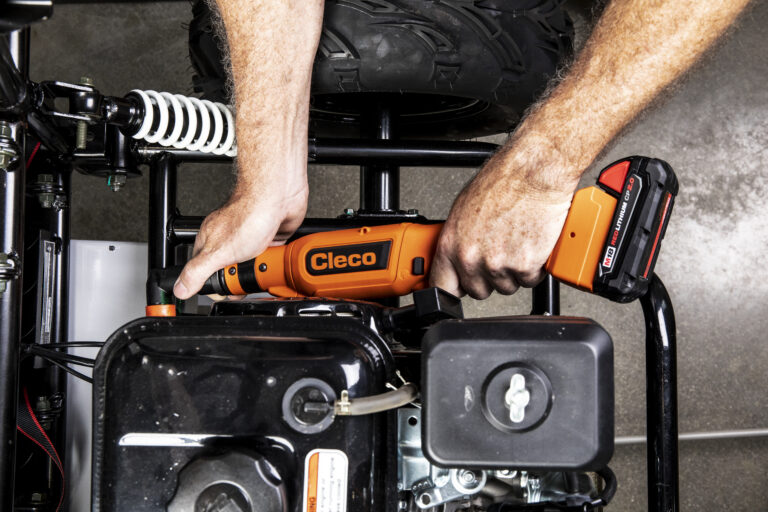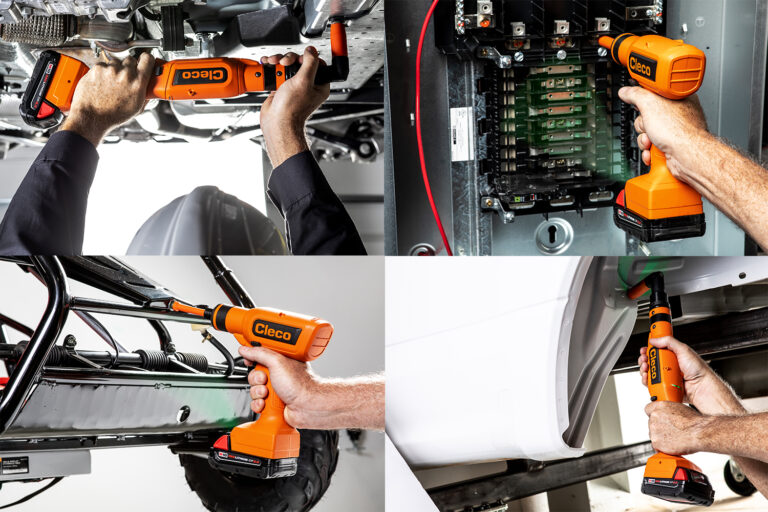
As global competition and customer demands accelerate, manufacturers are transforming their operations into smarter, more adaptive, and highly connected environments. This evolution—known as Industry 4.0 has brought sweeping change to the factory floor, where data, traceability, and flexibility are just as important as power and speed. In these new smart manufacturing ecosystems, every process must be transparent, traceable, and adaptable to rapid change.
In this context, the Cleco Cellclutch Cordless Electric Tools are more than just torque tools—they are intelligent devices engineered to integrate seamlessly into the modern digital factory. With features like programmable torque settings, multi-stage rundowns, batch counting, and wireless data connectivity, CellClutch Tools deliver the flexibility, accuracy, and traceability required to thrive in high-mix, high-complexity production environments.
The Changing Face of Manufacturing: Industry 4.0 & Flexible Assembly
Industry 4.0 refers to the fourth industrial revolution—a shift from traditional manufacturing toward cyber-physical systems, where machines, sensors, and humans are interconnected through networks and data platforms. This shift enables manufacturers to:
- Adapt quickly to changes in product demand
- Reduce downtime through predictive analytics
- Improve quality by monitoring every assembly event
- Increase traceability and compliance with real-time tracking
- Automate decision-making at the workstation level
Flexible manufacturing — the ability to quickly change product lines, configurations, or tooling without extensive downtime—is a core requirement of Industry 4.0. Cleco CellClutch Tools are purpose-built to support this dynamic, data-driven environment.
Key Features That Align with Industry 4.0

1. Wireless Connectivity (Wi-Fi and Bluetooth)
CellClutch Connect Tools come standard with Wi-Fi (2.4/5 GHz) and BLE 4.2 Bluetooth, allowing them to communicate directly with manufacturing execution systems (MES), quality databases, or Cleco’s own mPro controllers.
This enables:
- Real-time torque and angle data capture
- Batch tracking by serial number, operator ID, or part number
- Remote tool configuration by product or station
- Immediate alerts for errors, missed fasteners, or out-of-spec torque
Wireless communication eliminates the need for wired programming or manual data transfers, streamlining traceability in live production.
2. Programmable Torque & Rundown Settings
CellClutch Tools allow users to create multiple torque programs directly on the tool—no PC required. This is vital in environments with:
- Multiple product variants
- Mixed-material fasteners
- Sequential fastening requirements
Each program can include:
- Target torque
- RPM settings
- Rundown duration
- Torque hold-off or delay steps
- Fastener count validation (batch mode)
This makes a single tool adaptable to a wide range of assembly tasks across an entire line or factory.
3. Data Logging & Traceability
With Industry 4.0, data is king. CellClutch Connect tools offer:
- Internal memory for torque event storage
- Exportable logs for batch review or quality documentation
- Tool authentication and operator assignment
- Integration with ERP and MES platforms
This data supports ISO 9001, Six Sigma, FDA 21 CFR Part 820, and other compliance frameworks. Manufacturers can trace any fastener to the specific torque applied, who installed it, and which tool was used—essential for warranty claims, audits, or root-cause analysis.
4. Visual Operator Feedback
Visual LED rings and audible “OK/Not OK” buzzers guide workers in real-time, improving speed and reducing mistakes without slowing down for manual torque verification. In flexible cells with rotating workers or variable product flows, intuitive feedback supports productivity even with minimal training.
5. Cordless Mobility for Reconfigurable Workspaces
Industry 4.0 plants favor modular layouts—reconfigurable cells with mobile fixtures, tools, and stations. CellClutch Tools support this vision with:
- Cordless operation (Milwaukee M18 battery compatibility)
- Lightweight, ergonomic design for multi-position use
- No need for compressed air lines or tethered programming
- Drop-tested magnesium housings for rugged durability
Workers can move from cell to cell with the same tool, programming torque settings for each task as they go.
Use Cases in Smart Manufacturing

1. Automotive Smart Factories
Modern automotive lines build multiple models on a single line, with different fastener requirements per vehicle. CellClutch Tools:
- Automatically adjust torque settings via controller commands
- Tie torque data to individual VINs for complete traceability
- Alert supervisors immediately if a fastener is missed or out of spec
This improves first-time quality while reducing inspection and rework.
2. Electronics & Consumer Goods
In electronics and appliance manufacturing, fastener specifications vary widely depending on materials, thread types, and thermal expansion factors. With Cleco Tools:
- Programmable multi-stage rundowns protect delicate threads
- Tool settings can be changed at the workstation based on scanned product barcodes
- Quality managers receive live data streams for trend analysis and alerts
This ensures each product is assembled correctly without overwhelming line workers.
3. Collaborative Robot Integration
CellClutch Tools can be integrated into collaborative robot (cobot) cells, enabling:
- Automated torque-controlled fastening
- Wireless communication with robot controllers
- Traceable fastener data assigned to each station
This supports semi-automated hybrid cells, where humans and robots share tasks, improving productivity without full automation investment.
4. Tier 1 and Tier 2 Suppliers
This supports semi-automated hybrid cells, where humans and robots share tasks, improving productivity without full automation investment.
- Torque data can be tied to specific work orders
- Process conformity can be validated on the fly
- Integration with cloud-based platforms supports offsite QA audits
This strengthens supplier relationships and ensures compliance with evolving OEM demands for transparency and accountability.
Advantages Beyond the Tool

Reduced Training Time
Workers don’t need specialized torque knowledge. LED indicators and buzzer feedback provide instant guidance, while pre-set torque programs simplify operation.
Fewer Tools Needed
One CellClutch tool can replace multiple traditional drivers by storing multiple torque profiles—reducing tool inventory, calibration overhead, and downtime.
Real-Time Quality Control
Supervisors can monitor fastening results live via dashboards, receive alerts, and stop production if a pattern of missed fasteners appears.
Support for Continuous Improvement
By aggregating fastening data over time, managers can identify trends in torque failures, retrain workers, or improve component designs.
In Industry 4.0, tools aren’t just hand-held machines—they are intelligent devices embedded in a connected, data-rich production network. The Cleco CellClutch Tool System was designed specifically to support this transformation.
With:
- Wireless communication
- Programmable, multi-stage torque control
- Ergonomic cordless design
- Data logging and MES integration
- Visual operator guidance
- Adaptability across multiple SKUs and stations
Cleco empowers manufacturers to move faster, build smarter, and compete globally with confidence.
Whether you’re building vehicles, electronics, or medical devices—if your operation is headed toward a flexible, traceable, digital-first future, Cleco CellClutch Tools are already there.
